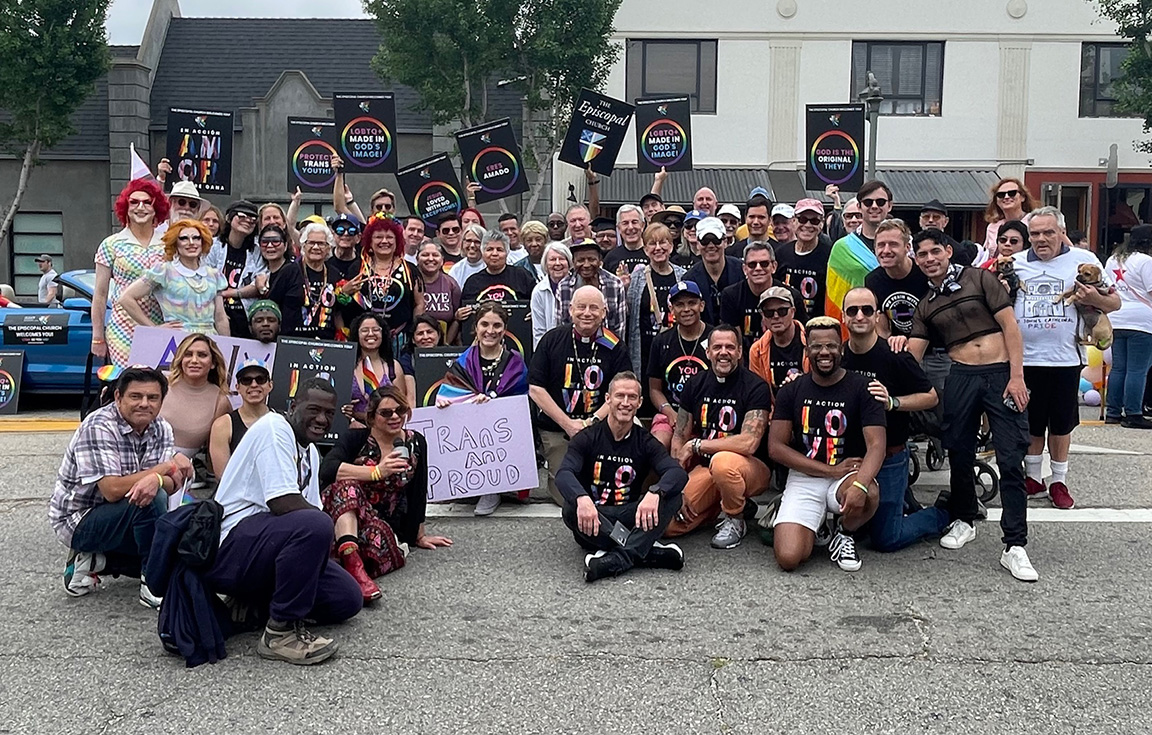
In the L.A. Pride parade staging area on Highland Avenue, members of the diocesan contingent gather before embarking on the one-mile route that turned east on Hollywood Boulevard. Photos: Bob Williams
[The Episcopal News] Next steps for the Bishop’s Commission on LGBTQ+ Ministry were in focus as 100 Southland Episcopalians marched in the 54th annual L.A. Pride parade June 9 in Hollywood.
“The prophets among us who have been struggling for justice for a half-century say that we’ve made a lot of progress with a lot of work left to do,” Bishop John Harvey Taylor noted in a reflection recapping his observations while riding in a red Mustang convertible as the diocesan contingent trekked the mile-long route lined by an estimated 100,000 parade-goers. Under the theme “Power in Pride,” the parade featured some 165 entries.
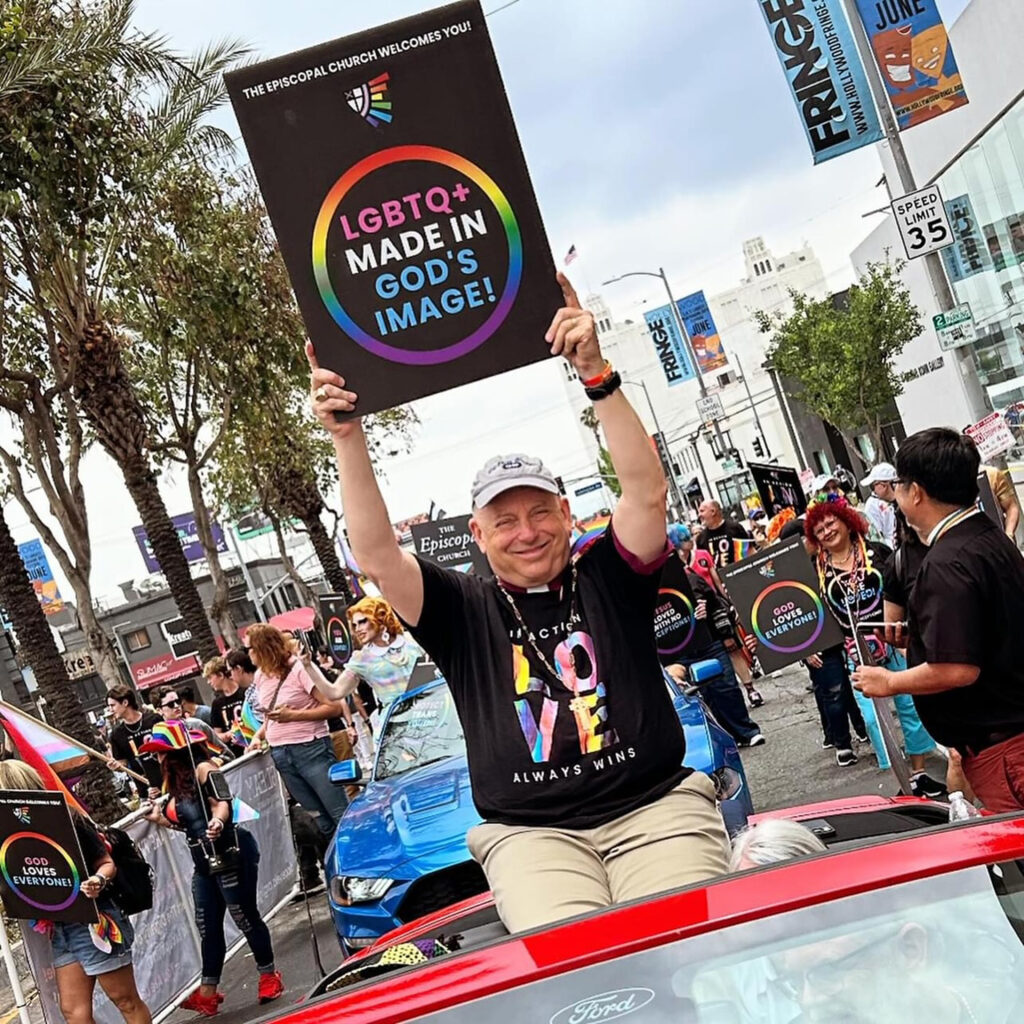
Bishop John Harvey Taylor brings a message of inclusive love during the L.A. Pride parade. Photo: Christopher Montella
“The hope I lean on is that people are ready to do the work, and all we have to do is call them into it,” said Thomas Diaz, the commission’s incoming chair, who is staff director of connection and care at All Saints, Pasadena, and a diocesan deputy to General Convention June 22-28 in Louisville, Ky.
Diaz sees three priorities emerging for the commission – bringing resources to local congregations, providing leads for LGBTQIA+ people experiencing housing insecurity, and convening project working groups around interest areas – all while building on the commission’s achievements since it was established in 1991 by Bishop Fred Borsch.
The Rev. Christopher Montella – the commission’s outgoing chair whose eight-year tenure has included coordinating Pride events before, during and after the pandemic – thanked parade participants for their longstanding support, dedication, and work with the commission’s GLEAM (Gathering LGBTQ+ Episcopalians in Active Ministry) task force that coordinates diocesan presence at regional pride events.
“We are at our Episcopal best when leadership transitions so that new and different voices and perspectives can come to the forefront,” Montella, who is rector of St. Stephen’s, Santa Clarita, told The News. “It’s built into our systems for a reason. I cannot wait to see and support what Thomas will do as he begins his term as chair of the commission.
“It’s been a privilege and a blessing to lead this commission these last eight years,” Montella added. “I give thanks for the support and trust of Bishop Taylor and Canons Kathy O’Connor, Melissa McCarthy, Jim White, Randy Kimmler, Susan Russell and Bob Williams, the Rev. Lorenzo Lebrija, and of course, Bishop Jon and Mary Bruno – all of whom taught, supported and encouraged me generously, helping to enrich my leadership in countless ways through the years.”
Montella also thanked All Saints’, Beverly Hills, which was represented by the largest parish group in this year’s parade, followed by members of St. John’s Cathedral and All Saints, Pasadena, among 11 participating congregations from Pomona to Huntington Beach. “All Saints raised me up as a place where I first heard God loves me just as I am and that there is no barrier between me and God whom I serve.”
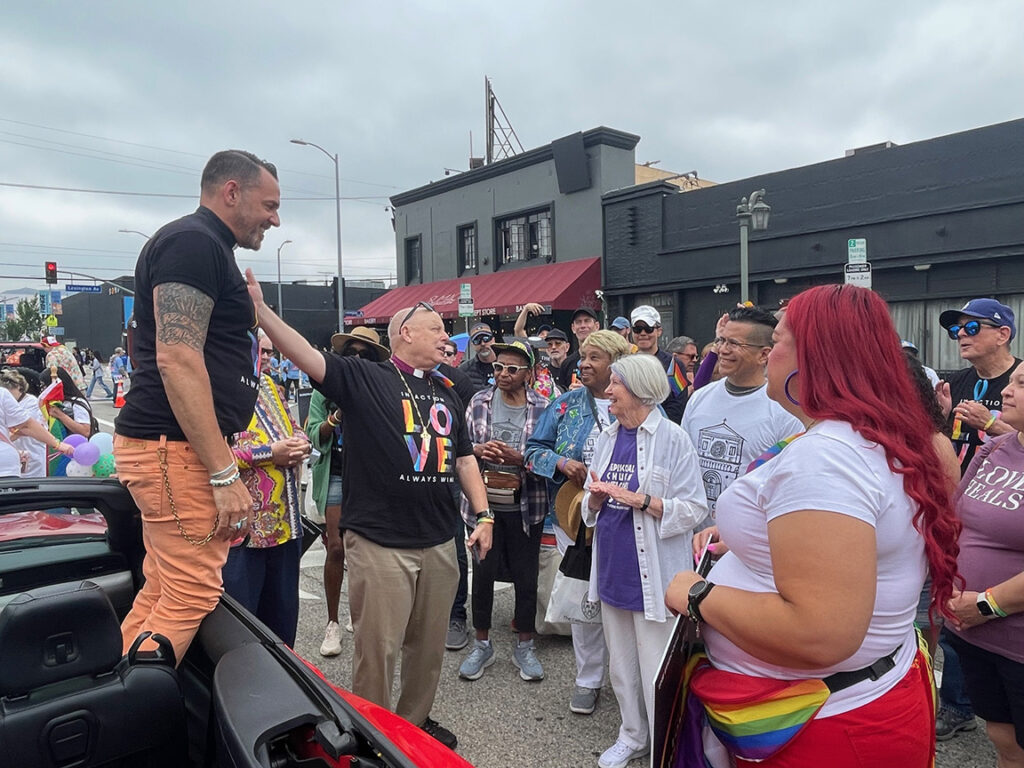
Bishop John Harvey Taylor thanks the Rev. Christopher Montella for dedicated work as commission chair overseeing L.A. Pride parade arrangements.
Sandra Martinez – a lay leader from St. Paul’s, Pomona, and a coordinator of local LGBTQIA+ ministries – agrees that The Episcopal Church must keep amplifying good news of love and inclusion. “We are doing so in Spanish and English,” she told The News, underscoring the importance of leadership training within the diocese.
Likewise, Diaz expanded upon priorities he sees as the commission’s new chair. “We need to make this commission more accessible throughout the diocese and determine how we can be a resource to parishes and missions that want to make their congregations more affirming. That process doesn’t happen overnight, and we need to equip the leadership of all parishes and missions to do that work.
“We can sit down with congregations to hear what are the gaps, how we can fill those gaps, and most importantly how we as the Episcopal Diocese of Los Angeles can assure that all of our congregations, parishes and missions can be an affirming spaces for all of God’s people,” he added.
“Second, we are in a crucial time with the housing crisis,” Diaz said. “Throughout the greater L.A. area, up to 40% of LGBTQ folks under 40 are housing insecure. So, we need to establish a program – not having to reinvent the wheel but utilizing resources that are already there – to ensure better housing for queer folks. Beyond greater L.A., we need to examine what’s happening in Ventura, Orange County, and the Inland Empire and see what resources are being utilized in those counties and bring them together so that we know whom to call. Folks are in need, and we need to be there for them.
“The third priority I have is to equip our folks to become advocates for all of the needs that are happening between now and the election and beyond, with people working together in sub-groups,” Diaz said. “I see myself as a convener. I want to convene folks into working groups around their passions, whether it’s transgender advocacy, housing, or helping parishes and missions establish a more welcoming space, a more belonging space in their congregations. The way I see it, we have to work as a team, as working groups, so that we are commissioned to go out into the community and make that happen.”
“It’s hard work, loving everyone as ourselves, especially if we’re feeling insecure or are afraid of losing something,” Bishop Taylor added to close his post-parade reflection. “Because we failed, Jesus died. Because he lives, we persist. The kingdom of God is like a Pride parade where no one’s home and everyone’s out, dancing in the streets.”
— Bob Williams is diocesan canon for common life.
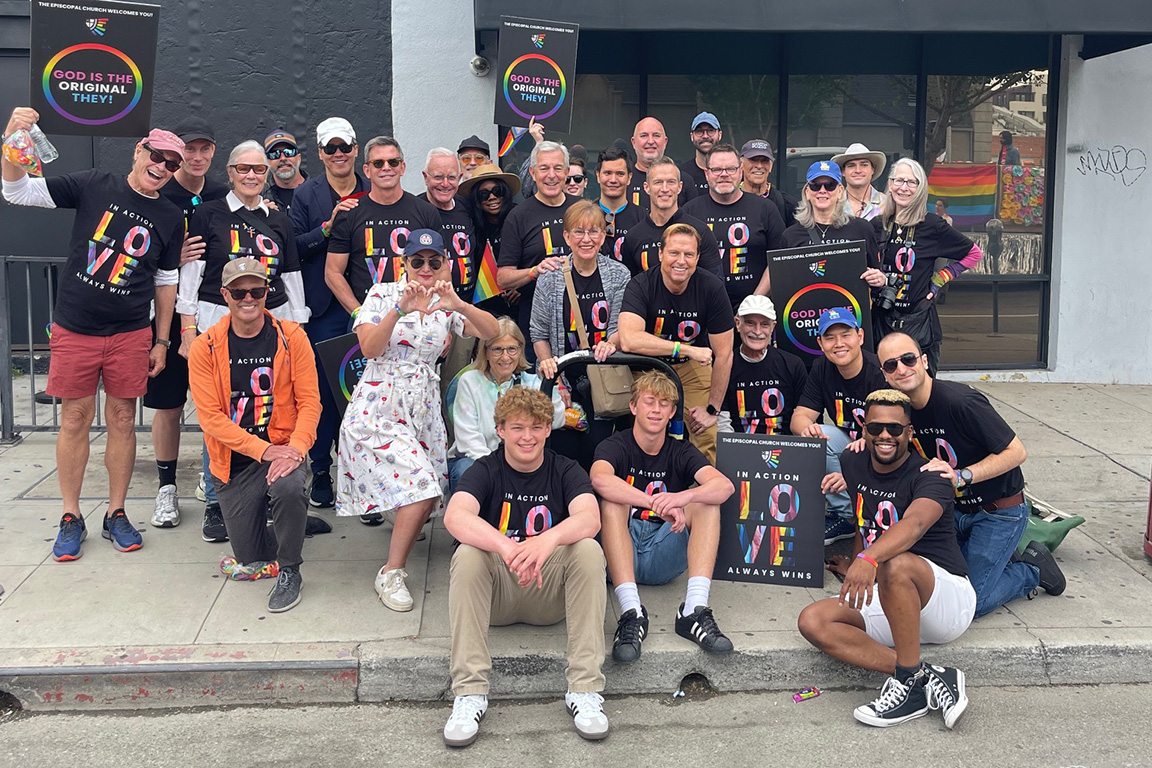
Members of All Saints’, Beverly Hills, comprise the largest diocesan parish group among L.A. Pride parade participants.
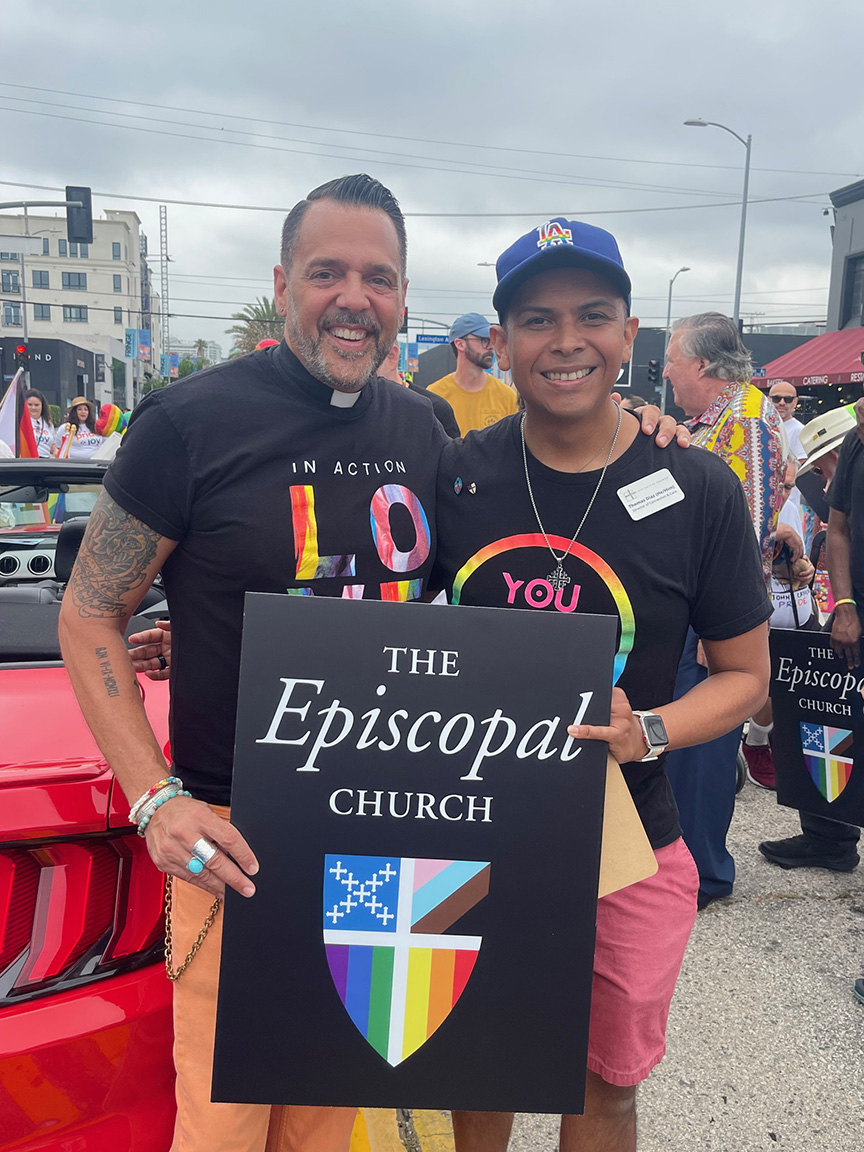
Guiding parade logistics are the Rev. Christopher Montella (left) and Thomas Diaz, outgoing and incoming chairpersons, respectively, of the Bishop’s Commission on LGBTQ+ Ministry.
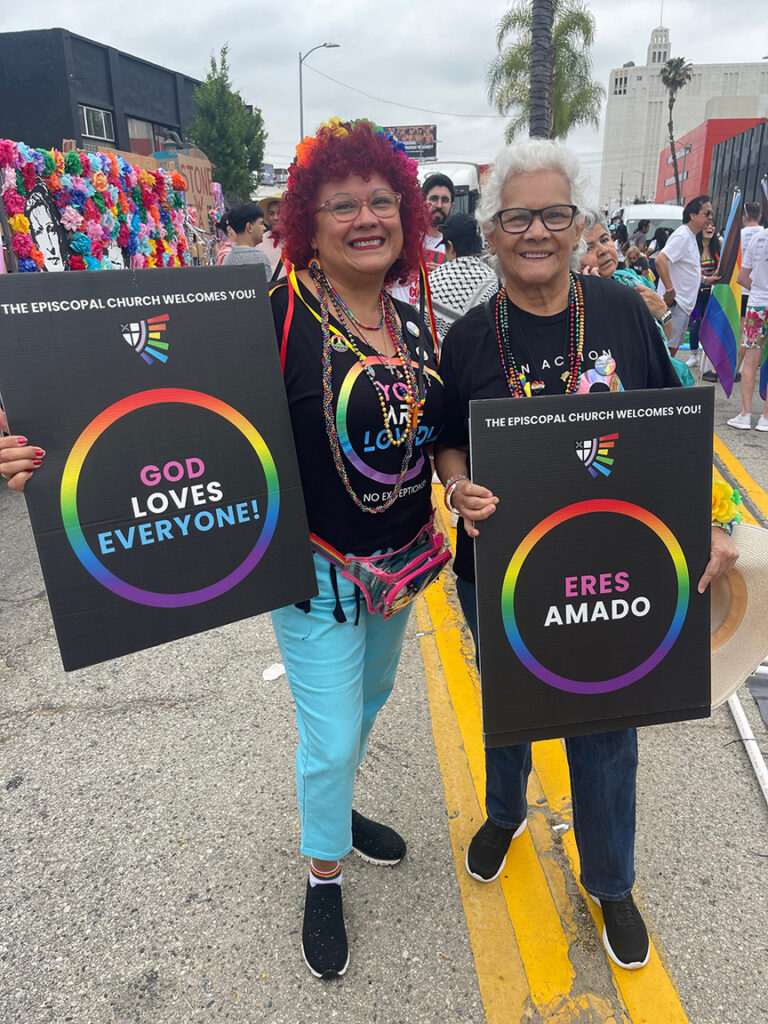
Sandra Martinez and Lee Moore represent their parish, St. Paul’s Episcopal Church, Pomona, at the L.A. Pride parade.
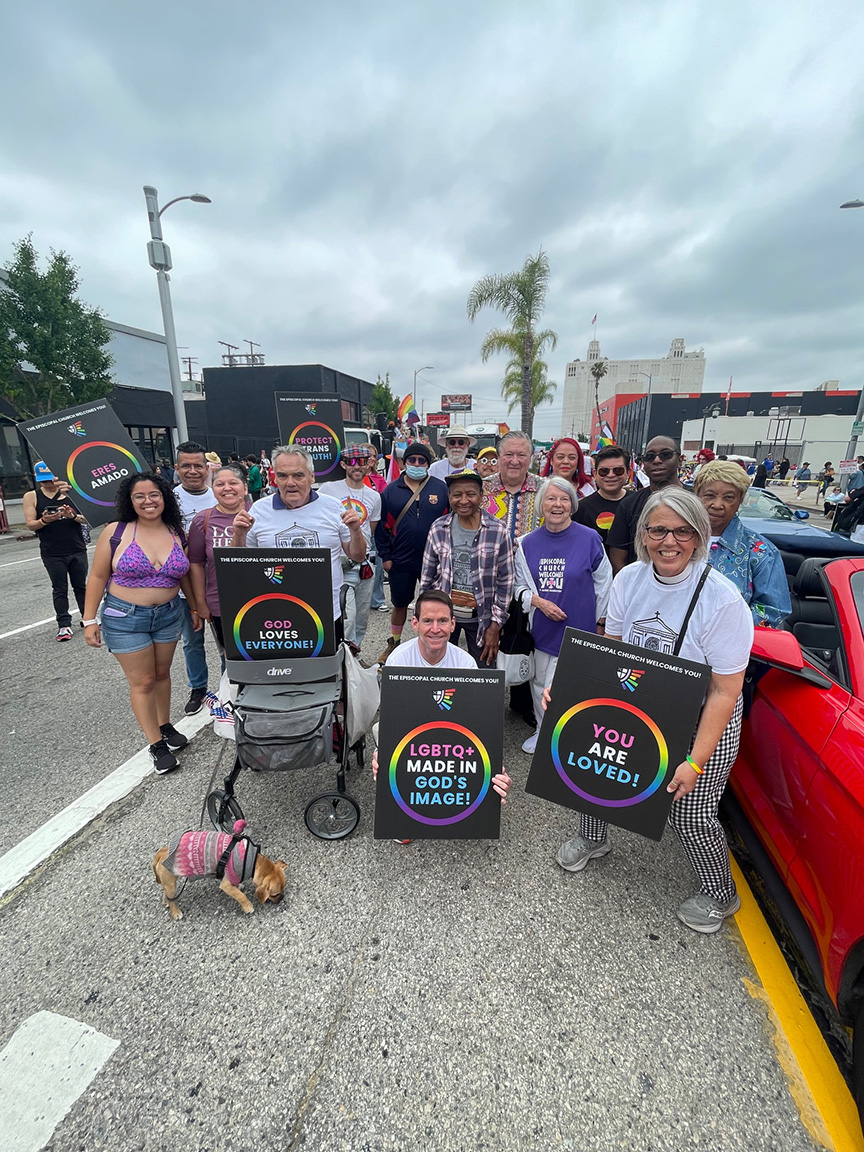
Parishioners of St. John’s Cathedral show their spirit before the L.A. Pride parade.
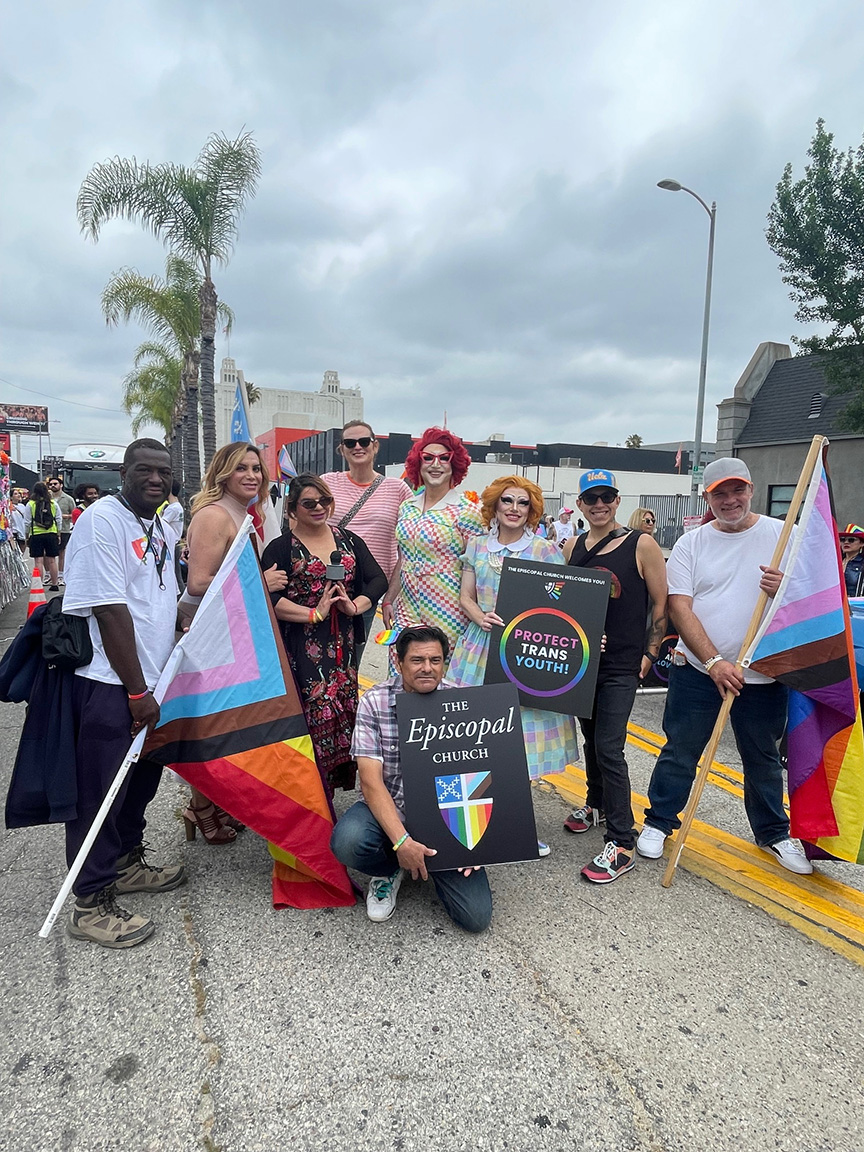
All Saints, Pasadena, members gather in the L.A. Pride parade staging area.
